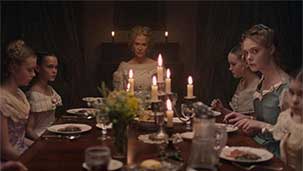You would have liked my grandmother. She was from a well-to-do family who placed the highest importance on being “ladylike”. But she had no compunction against ramming one of her knuckles into my back to make me sit up straight, or threatening to jab me with a fork if I dared put my elbows on the dinner table. Violence was merely a means of maintaining appearances. Needless to say, around her, I was quite the proper young lady. Almost to a fault.
From a young age, women are taught to be nice. Nice and pleasant and well-mannered. These virtues date back to a time not so long ago when a woman’s greatest ambitions were to marry well, bear healthy children, and run a respectable household. Today, etiquette feels like a quaint affectation, though for centuries it dictated how polite society was conducted. But when society falls into a state of war, etiquette, for some, is the only way to keep one’s humanity. It is a luxury that must be maintained at all costs.
Set three years into the American Civil War, The Beguiled opens on a young woman in Virginia singing to herself as she forages in the woods adjacent to Miss Farnsworth’s Seminary School for Girls. It is one of the few wide shots in the film, and we see her walking on a long, dusty road, dwarfed by the hanging moss and nearly drowned out by chirping cicadas and menacing crows. It is so hauntingly dreamlike, that when she stumbles upon an injured Union soldier he hardly seems real. Indeed, director Sofia Coppola’s film always feels contrived, outside of reality, a sumptuous, gauzy morality play that lingers like a guest who should have left long ago, and yet you’re not unhappy they stayed.
The seminary is home to five young women who have been left at the school for safe keeping, their mournful teacher Miss Edwina, and the school’s weary but capable head mistress, Miss Martha, who is quick to inform the lame soldier that he is not a guest, but “a most unwelcome visitor”. From the moment he enters the baroque plantation home, Corporal McBurney’s presence provides the ladies a welcome distraction from the mundane horrors of war, despite the fact that he is the enemy.
The ladies are simultaneously fearful, titillated, and intrigued by the grateful stranger, but three of them are particularly susceptible to McBurney’s charms - teen tempest, Alicia, who roils with untamed sexuality and raging boredom, the palpably lonely Miss Edwina, who has never known love, and the unflappable Miss Martha who has loved and lost and therefore knows exactly what she’s missing. The tension of this love quadrangle is drawn so taut from the start that it isn’t a matter of if but when - and how - it will snap.
What starts as an ingrained responsibility to Southern Hospitality – tending to a stranger, sharing scant resources, retiring to the music room – quickly becomes something more seductive as the ladies actively make McBurney increasingly comfortable to the point of no return. A chance to turn him over to passing Confederate soldiers is dismissed. Giving up a wounded prisoner would be the opposite of the Christian charity that defines their cherished Southern values. The characters are constantly adjusting their moral compasses to justify their actions, and though many of these actions are telegraphed, the cast assembled is deft enough to dance us through these manipulations while maintaining the film’s delicious sense of unease. Elle Fanning’s dangerously lustful Alicia, Kirsten Dunst’s heartbreakingly brittle Edwina, and Nicole Kidman’s quietly confident Miss Martha are all evenly matched against Colin Farrell’s opportunistic McBurney, who contorts his personality to give each woman what she secretly wants.
Coppola has created a claustrophobic world in which her characters exist – from the shadowy, naturally lit interiors of the once-grand home, to the washed-out, virginal white pinafores and petticoats constraining the women, and the lush, fecund landscaping that has overgrown the plantation, seeming to trap them behind its filigreed gates – and begs the question, is the listless haven they inhabit behind these gates more dangerous than the war-ravaged world beyond them?
In a time of war, people must do things they may have never thought themselves capable of previously. These ethical conundrums are often directly at odds with the gentility and propriety that once defined them. Coppola constructs a diaphanous, ethereal universe for this melodrama, keeping us somewhat at arm’s length. It’s only when the women stop being nice, and polite, and finally find their power that this film finds its strength.
Sincerely,

Di







